Can the Nordic labour markets survive the green transition?
Nearly one in three Nordic citizens worry they might lose their jobs because of the green transition, according to a new Nordregio survey. How can the social partners work together to make the transition as fair as possible? That was the theme during the Nordic dialogue conference in Iceland.
On 1 December, representatives of the Nordic governments, employees and employers met in Reykjavik. Iceland’s Minister of Social Affairs and the Labour Market was the conference host.
“No one solution fits all, but I hope that together we can find ways of carrying out the green transition in the labour market. And it is urgent,” said Guðbrandsson.
Fearing job losses
And if anyone was in any doubt: We are worried about whether our labour markets will manage the green transition. That is what researcher Gustaf Norlén from Nordregio concluded quite early on the conference day.
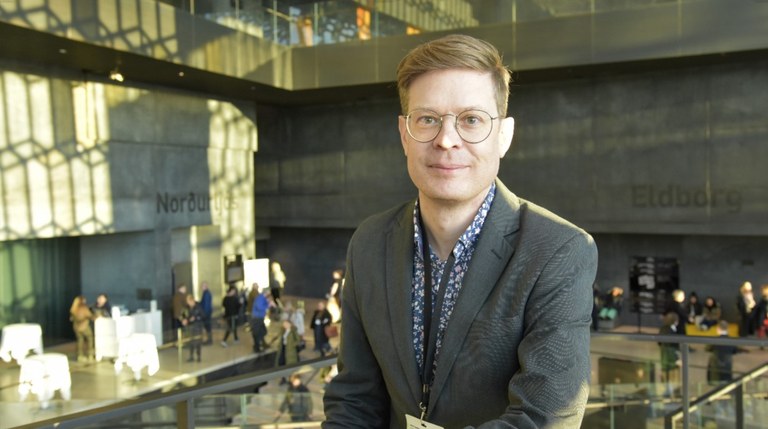
Gustaf Norlén, Nordregio researcher.
Many studies have been carried out to better understand how people will be impacted by climate change and the green transition. One of them is a Nordic survey from 2022 which shows:
- 71 per cent agree that climate change is a serious or very serious problem.
- 27 per cent worry that some jobs in their countries or regions could be at risk because of the green transition.
- 31 per cent of the Nordic population believe climate mitigation initiatives will help create new jobs in their area.
- 35 per cent do not believe climate mitigation initiatives will have any positive effects on the labour market.
Differences between urban and rural areas
The survey shows that people in the Nordics have differing opinions on how climate policies will impact jobs. People in Greenland are the most optimistic while people in Norway and Finland are the most pessimistic.
There are large differences between different regions in the Nordics when it comes to how far the green transition has progressed.
“We see that most of the green jobs are in urban regions, while the “brown”, polluting jobs are found in the districts. People in the districts are also more worried about climate change,” said Norlén.
Honesty pays
Not telling people that their current job might be gone in five years, is doing them a disservice, believes Sólrún Kristjánsdóttir. She is the CEO of Veitur Utilities, part of Reykjavik Energy.
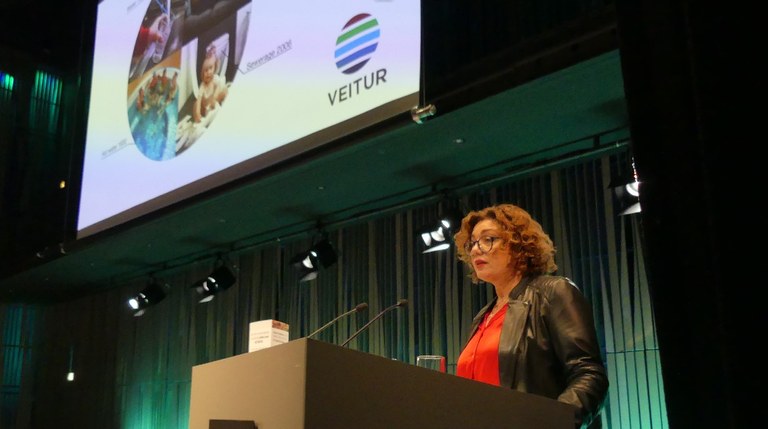
Sólrún Kristjánsdóttir, CEO of Veitur Utilities. Photo: Björn Lindahl
Kristjánsdóttir explained how her company works with employees for the green transition. She thinks it is crucial that leaders are honest with employees.
“It is hard to tell someone you know and care about that the job they are doing today might be gone in five years. But it is far worse not to do it,” says Kristjánsdóttir.
If you fail to tell people about the need for change, employees cannot actively become part of the solution by, for instance, taking further education or retraining.
“We cannot stop the green transition. Jobs disappear, new ones emerge. Our job is to make sure nobody is left on the platform as the train is leaving,” said Kristjánsdóttir.
Own the transition
Inclusion is a keyword, believes Kristján Þórður Snæbjarnarson, the President of the Council of Nordic Trade Unions (NFS).
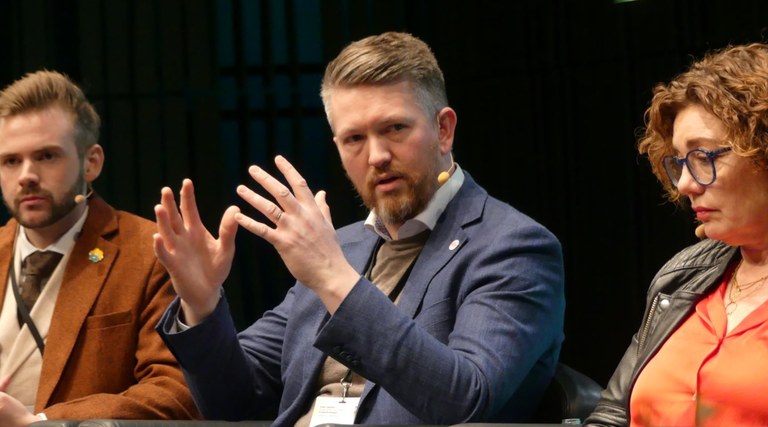
Kristján Þórður Snæbjarnarson is Chairman of the Icelandic trade union confederation ÁSI, and also President of the Council of Nordic Trade Unions (NFS) in 2023. Photo: Björn Lindahl.
“When you are included, it also commits you. That is why everyone must have ownership in the green transition. This has not been the case in all workplaces, at least not here in Iceland,” he said.
What are green skills?
Johan Hall, research officer at the Swedish Trade Union Confederation (LO), encouraged everyone to address the following three questions in their workplace:
- How does what we do impact on the climate?
- What do we have to do to gradually become climate neutral?
- What knowledge and skills do we need to manage this change?
It is indeed the lack of the right skills as well as a general lack of labour that worries workers as well as employers and authorities in the Nordic region.
“What are green skills, exactly? There is no one answer to this question. It will vary from job to job and between sectors,” pointed out Mikko Vieltojärvi from the Confederation of Finnish Industries EK.
Vieltojärvi also pointed out the need for investments in innovation and new technology.
“Without new technology, we will not succeed with the green transition,” he said.
Not enough people
Vieltojärvi underlined the importance of a good basic education for all. Without the basic skills, it is difficult to get higher education and/or further education later on.
“But I believe that training people is the least of our problems. The labour shortage is a much bigger challenge, at least in Finland,” said Vieltojärvi.
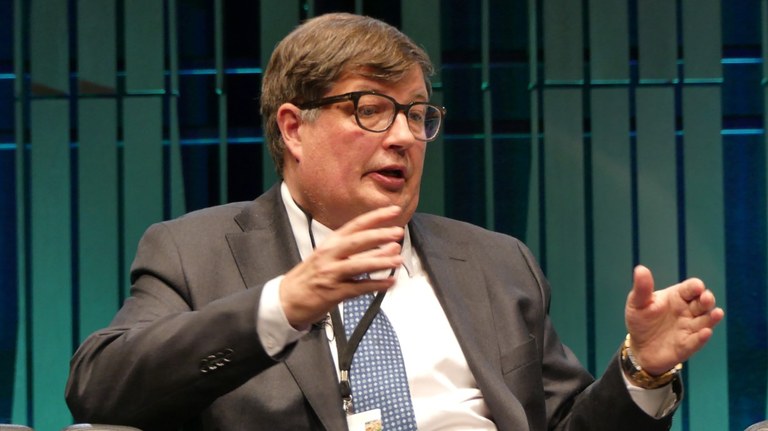
Finland's Minister of Employment Arto Satonen. Photo: Björn Lindahl.
This worries the Finnish Minister of Employment Arto Satonen too.
“Labour shortages are a common Nordic problem which we must work together to solve,” he said and pointed to the need for more labour immigration and to getting people outside of the labour market back in.
Give the development some support
Victoria Kirchhoff, Deputy President of the Swedish trade union Unionen, said Sweden now has a good model for further education and training. Experience shows that this model by and large allows employees access to further education or retraining. The state pays 80 per cent of the wages of those who want to study, as long as the education is considered to be needed in the labour market.
“We have to get further education during a long working life,” she said.
Kirchhoff underlined that there are still plenty of challenges to get on with, including the lack of experts in technical positions in Sweden.
Several of the speakers pointed out that it is important not to give in to “gloom and doom” and become far too pessimistic.
“We should talk more about technological developments and perhaps less about the green transition. We should focus more on the positive aspects of new technology,” said Ulrika Lindstrand, leader of Engineers of Sweden and deputy leader of the Swedish Confederation of Professional Associations (Saco).
She too is focused on skills.
“We have to renew and improve our education systems. If we do not top up on skills, we will not succeed with the green transition,” said Lindstrand.
She highlighted there is also a need to take care of workers who do not wish or cannot manage to take part in the green transition.
Are we not ready for what is about to hit us?
Far too few workers can relate to what the green transition really is, believes Hans-Erik Skjæggerud, President of the Norwegian Confederation of Vocational Unions (YS). He wants every workplace to have a conversation about the green transition.
“Many workers do not understand how this will impact the job that they are doing. One of our tasks is to make this understandable for people,” he said.
Bernt G. Apeland agrees with the YS President that much can and should be done in the individual workplaces. Apeland is the Executive Director of Virke, the Enterprise Federation of Norway.
He believes it is important to map the skills gap which will emerge as a consequence of the green transition.
“In order to succeed with the green transition, we need a thriving business sector with access to capital. We also need employees with the right skills,” said Apeland.
- "Be honest!"
-
That was the advice from Solrún Kristjánsdóttir, CEO OF Veitur Utilities. She has had conversations with employees about what the green transition might mean to them. To her left is Kristjan Tordur Snæbjarnarson, President of the NFS, and to her right is Karen Elleman, Secretary General of the Nordic Council of Ministers.
- Skills improvement in Icelandic industries
-

A recent agreement between employers and employees in Iceland shows how cooperation for the green transition can work.
Andrés Magnússon and Sigmundur Halldorsson sit on opposite sides of the negotiating table. Together, they have made a plan to secure industries the right skills in the future, while also making sure people can keep their jobs.
There is a great need for new skills, especially within digital expertise and sustainability.
Over a period of six years, four in five employees will take further education or retrain.
“If Iceland’s industry is to remain competitive in future, we have to do something. We did this because we don’t trust that the ordinary education system will manage. I worry that Icelandic education is not good enough,” said Andrés Magnússon, Secretary General of the Icelandic Federation of Trade and Services SVÞ.
Sigmundur Halldorsson, special advisor at the Icelandic VR trade union, shares this concern.
“We have not invested enough in education and further training in Iceland. When you finish school or university you are supposed to be trained for life. We lack an understanding of the importance of further training,” he said.
- Nordregio's report
-
Read the report Embracing the just green transition on the Nordic labour market here:
Authors: Anna Lundgren, Hjördís Guðmundsdóttir, Gustaf Norlén and Anna Berlina
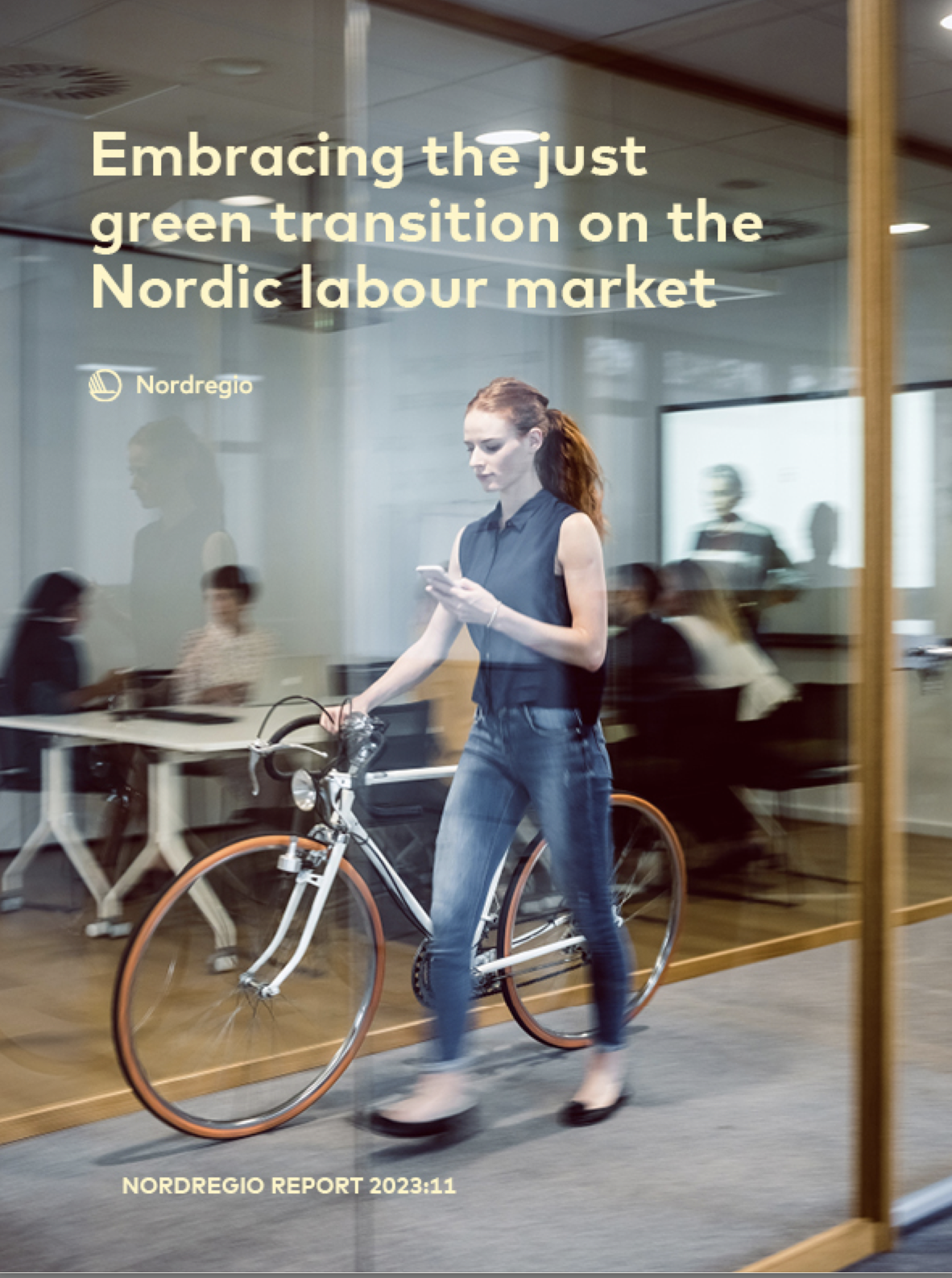
 Follow us on Facebook
Follow us on Facebook
